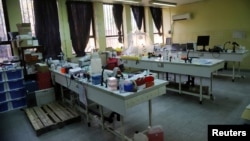Fighting continues in the eastern Democratic Republic of Congo, with the United Nations saying at least 773 people have been killed and over 2,000 others injured in the past week as M23 rebels seized the city of Goma.
While the U.N. and the U.S. consider M23 a rebel group, the DRC views it as a terrorist organization.
Shortly after taking over Goma, the M23 rebels cut off the internet and electricity in the city prompting a warning from the International Committee of the Red Cross (ICRC) that the power cuts could lead to “unimaginable consequences if the [samples], including the Ebola virus” were to leak from the laboratory of the National Biomedical Research Institute.
Russia’s state agency Rospotrebnadzor responded to the ICRC warning, accusing the U.S. and France of irresponsible handling of dangerous pathogens in the “third countries.”
“The activities of this laboratory are financed by the US Agency for International Development and the French Merieux Foundation,” Rospotrebnadzor said in a statement.
The Russian agency went on to further accuse the U.S. and France of creating circumstances for potential public health disasters.
“This circumstance once again confirms the irresponsible approach of Western countries when working with dangerous infections in the territory of third countries, when biological facilities are created without the proper infrastructure and samples of pathogens of dangerous diseases are accumulated without control.”
The claims that the facilities lack infrastructure and pathogens are accumulated without control are false.
The National Biomedical Research Institute, which uses the French acronym INRB, was founded in 1984 by the Ministry of Health of the Democratic Republic of Congo (DRC) for national biomedical research to identify, treat and prevent disease outbreaks in the DRC.
The institute’s Rodolphe Merieux Laboratory is a collaboration project with the France-headquartered Merieux Foundation that fights infectious diseases globally.
According to the Merieux Foundation, the INRB lab in Goma is equipped with state-of-the-art technologies that meet the highest international standards of quality, biosafety and biosecurity.
The U.S. Agency for International Development (USAID) started co-funding the institute in November 2019 at the request from INRB director Jean-Jacques Muyembe-Tamfum, after the 10th Ebola virus disease outbreak in the eastern DRC.
INRB has been a collaboration center for the World Health Organization (WHO) since 2018 and works with the U.S. and Africa Centers for Disease Control and Prevention (CDC), Washington State University and Johns Hopkins University, among others, in the surveillance and response to epidemic or potentially epidemic diseases.
When the International Committee of the Red Cross expressed its concerns on Jan. 28, it did not say the pathogens had been “dangerously accumulated” as Russia's federal agency claimed.
Rospotrebnadzor’s claims are part of Russia’s decadeslong widespread disinformation campaigns in Africa aimed at attacking U.S.-funded public health efforts in the continent.
In February 2024, the Global Engagement Center, the State Department's unit countering disinformation, said the Russian intelligence service had launched “major campaigns to target U.S. and Western health initiatives in Africa with dangerous health-related disinformation.”
“From there, conspiracies will be spread about Western pharmaceutical corporations, health-focused philanthropic efforts, and the spread of disease in West and East Africa,” the State Department said.
On Oct. 31, 2023, the then-head of Russia's troops trained for radiological, chemical and biological defense, the late Lieutenant General Igor Kirillov, falsely claimed that the U.S moved part of its “unfinished” biological weapons projects from Ukraine to Africa and “the work is underway in Cameroon, the Democratic Republic of Congo, Nigeria, Sierra Leone, and Uganda.”
